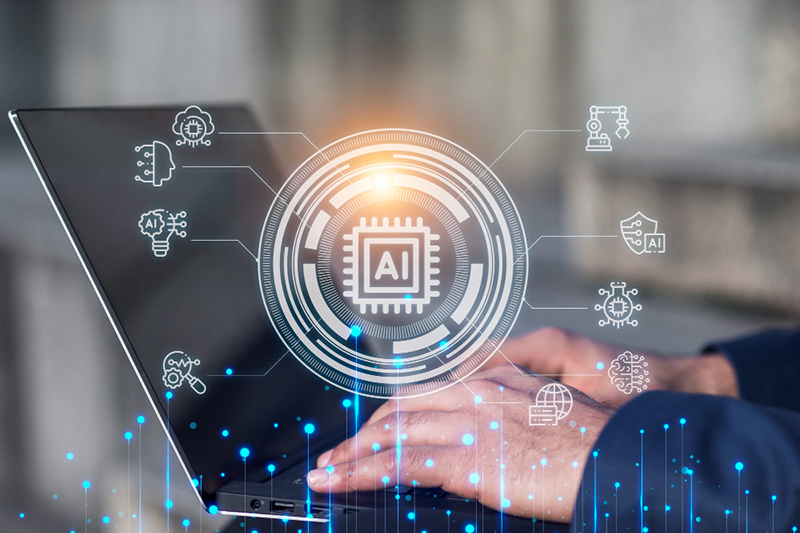Key Takeaways:
- Artificial Intelligence (AI) and Machine Learning (ML) significantly improve medical coding accuracy and efficiency.
- Computer-Assisted Coding (CAC) systems streamline healthcare administration and can lead to considerable cost savings.
- Integrating AI into medical coding offers a proactive data management and claim processing approach.
- Data privacy is paramount in AI and CAC systems, requiring robust safeguards to protect sensitive information.
- Educating healthcare professionals about AI technologies ensures a more seamless adoption of these advanced tools.
- The trend towards global AI adoption in medical coding signifies an important shift towards high-quality, patient-centric healthcare.
The Rise of AI in Healthcare
Artificial Intelligence has been a transformative force in various sectors, and its influence in healthcare is rapidly expanding. From predictive analytics aiding in early diagnosis to robotic surgery providing precision unattainable by human hands, AI applications in healthcare are vast. In medical coding—a sector reliant on the meticulous analysis of health records and other data—AI promises to enhance operational effectiveness remarkably. Such efficiency brought forth by AI is driving a significant paradigm shift as healthcare providers acknowledge the potential for this technology to improve patient outcomes and system sustainability.
Understanding Computer-Assisted Coding Systems
Computer-assisted coding systems represent a burgeoning area within health informatics, where technology aids in extracting and assigning appropriate medical codes. These codes are vital, as they translate complex medical records into standardized data utilized for billing and analytics. By leveraging the power of natural language processing, CAC systems interpret clinical narratives and automate code assignments, fostering a new degree of accuracy and productivity. This automation allows healthcare coders to focus on more complex cases and reduces the cognitive load associated with manual coding. Transitioning to computer-assisted coding is challenging, but the rewards for efficiency gains and error reduction are significant.
Enhancing Coding Accuracy with Machine Learning Algorithms
Machine Learning, a subset of AI, is particularly well-suited to improving the accuracy and reliability of medical coding. Algorithms can analyze vast datasets to identify patterns and accurately predict outcomes. When applied to medical coding, machine learning algorithms can review healthcare claims, indicate which codes are most applicable, and flag those requiring a closer look, reducing the incidence of billing errors and claim denials. Healthcare institutions can ensure a solid financial footing while dedicating more resources to patient care by implementing sophisticated technology documented in resources like this PubMed Central article.
Data Privacy and Security in AI-Assisted Coding
Data privacy remains a cornerstone of patient trust in healthcare systems, and integrating AI into medical coding heightens the need for secure data practices. With AI systems processing immense volumes of sensitive health information, ensuring the confidentiality and integrity of this data is of utmost importance. Healthcare entities must ensure they comply with regulations such as GDPR and HIPAA when implementing AI tools. Additionally, robust cybersecurity measures, including comprehensive data encryption and access controls, are indispensable in this new era of health informatics.
The Financial Impacts of Improved Coding Systems
The financial dimensions of AI and machine learning in medical coding are particularly noteworthy. Accuracy in medical coding is directly linked to the reimbursement process, and as such, errors can lead to significant revenue loss. CAC systems, empowered by AI, contribute to a reduction in errors, timely claim submission, and enhanced compliance with evolving codes and guidelines. Such improvements optimize healthcare providers’ revenue cycles and prevent the costly penalties associated with misreporting. The economic rationale for adopting CAC is thus compelling, promising a return on investment that extends beyond monetary gains to include quality of care and patient satisfaction.
Training Healthcare Professionals for AI Integration
Healthcare professionals must be sufficiently prepared to integrate AI and machine learning into their workflows. Educational initiatives and training programs are crucial in bringing medical coders, billers, and other relevant staff up to speed with these new technologies. An informed workforce is more apt to embrace and leverage AI to its full potential, reducing the resistance often accompanying change. Moreover, ongoing professional development ensures that AI tools are utilized effectively and ethically, aligning with best practices and standards in healthcare.
Examining Global Adoption Trends of AI in Medical Coding
Internationally, healthcare systems are increasingly aware of the benefits provided by AI-enabled medical coding. Advanced economies are investing heavily in AI research and application, recognizing the strategic value of healthcare innovation. While adoption rates vary, the trend points towards a unified objective: integrating AI to enhance healthcare administration and patient care quality. This global movement signifies a milestone in health technology and a collective effort to redefine the scope and delivery of medical services worldwide.
Future Prospects of AI in Medical Documentation
Peering into the future, we see a landscape where AI is embedded into every facet of medical documentation. Beyond coding, AI could assist in real-time patient monitoring, personalized treatment plans, and even predictive health analytics. Such advancements might render current practices obsolete as more sophisticated, intuitively designed AI systems take hold. Healthcare professionals will have to adapt continuously, welcoming the heightened role of AI within their daily tasks. Articles highlight forthcoming developments that could radically transform medicine as we know it, placing patients at the center of a tech-enhanced healthcare model.
The advent of AI and machine learning within medical coding is a profound shift within healthcare, hinting at a future where technology is both a facilitator and enhancer of health services. Embracing these advances means more than just accommodating new software; it entails a fundamental transformation in how healthcare entities manage data, interact with patients, and approach the business of care. As such, the promise of AI transcends mere operational advantages—it represents a stride towards a more effective, equitable, and responsive healthcare system.


